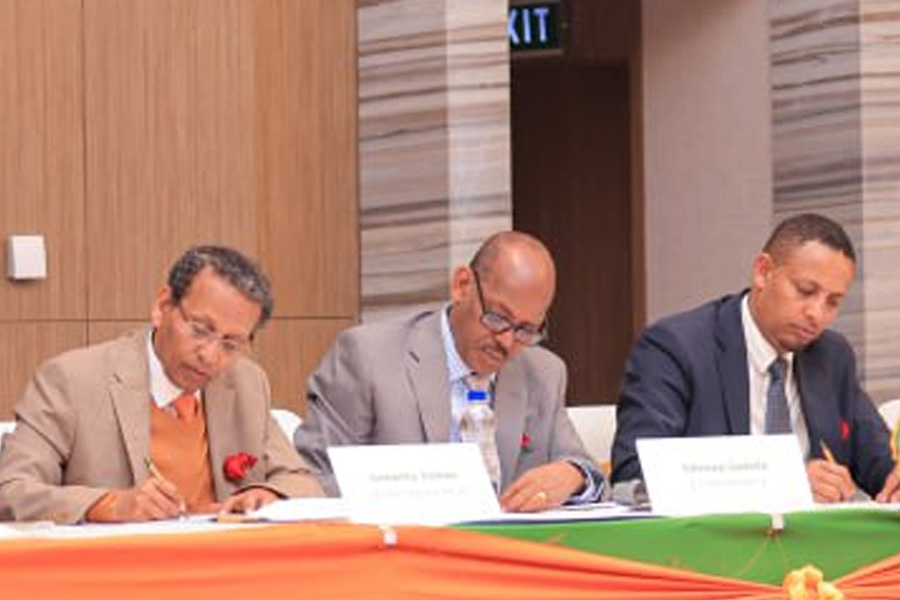
Local manufacturers plagued by foreign currency shortages held a panel discussion with government officials on product quality and market competitiveness. The forex shortage has deterred importing inputs vital to quality products and manufacturing at full capacity.
The State Minister for Industry, Tarekegn Bululta pointed out that customer satisfaction and affordability should be at the core for local manufacturers’.
Manufacturers cited import dependency on materials and unavailability of certification to sell the products in the international market as challenges while investment governance issues were raised as a problem to the business succession.
"The ministry is working on this," said Tarekegn.
Minister Melaku Alebel presented to Parliament a nine-month report last week that the five manufacturing sectors brought 266 million dollars, which was only 69pc of the plan.
According to Melaku, the revenue seems lower than the plan as his Ministry planned to achieve a higher target than the year before. Last year's export of manufactured goods brought in half a billion dollars of revenue.
Endale Mekonnen, state minister for Trade & Regional Integration who was moderating the discussion, said that 90pc of the products failed to thrive in the international market for being substandard.
One of the panellists Tihitina Legesse, managing director of Waryt Furniture, remarked the quality of the input materials plays a significant role in the end result.
The lack of skilled labour was another challenge resulting in low-quality production. The panellist Daniel Kitaw (Prof) from Addis Abeba University, suggested manufacturers and universities collaborate to create competitive manpower.
The panel discussion was held on the last day of an expo organised by the Ministry of Industry at Millenium Hall, Africa Avenue (Bole Road).
The expo with the moniker “Ethiopia Tamrit” entailed efforts to substitute imports with locally manufactured products which only have a 37pc market share in the country.
According to the State Minister, the government has plans to increase the market share to 60pc.
The five-day expo was launched by Prime Minister Abiy Ahmed (PhD), while Deputy Prime Minister Demeke Mekonen made an appearance on the closing day.
It was visited by over 40,000 people. From vehicle assemblers to Agriprocessors, garments, tanneries and furniture manufacturers, more than 124 small and medium industrialists showcased their products.
Waryt Furniture, BejaiEthio Industrial & Engineering Solution, Ker Ezhi Ethiopia and 54FMCG were among the notable brands that participated.
Visitors’ heads were turned to a big animal feed plant that takes up 200sqm erected outside the gateway. Manufactured by BejaiEthio Industrial & Engineering Solution, the machine processes Maize, Sorghum and Lime while operating manually and automatically.
The process begins by adding the commodities into the suck dump, going through the grinding and measuring until packing machines for the finished feed.
The company was established by 15,000 Br capital.
According to the Manager, Bejai Naiker Nerash, the machine was sold for nine million Br to a Sudanese investor at the expo. He said local machinery is advantageous, with easy access to maintenance.
Belete Serahbizu (PhD), a manufacturing and material engineer for 12 years, observes the sector is highly dependent on raw material import, hindering small enterprises' growth. Although the initiative is promising, Belete advises it should be backed by a long-term socioeconomic strategy. He recommends that manufacturing raw materials be considered for the sector to flourish.
PUBLISHED ON
[ VOL
, NO
]

Radar | Mar 13,2021

Commentaries | Jul 18,2020

Radar | Jan 09,2024

Radar | Nov 07,2020

Radar | Jan 18,2020

Fortune News | Dec 26,2020

Commentaries | Jul 10,2021

Radar | Dec 15,2024

Fortune News | Jan 07,2023

Radar | Apr 09,2022

Dec 22 , 2024 . By TIZITA SHEWAFERAW
Charged with transforming colossal state-owned enterprises into modern and competitiv...

Aug 18 , 2024 . By AKSAH ITALO
Although predictable Yonas Zerihun's job in the ride-hailing service is not immune to...

Jul 28 , 2024 . By TIZITA SHEWAFERAW
Unhabitual, perhaps too many, Samuel Gebreyohannes, 38, used to occasionally enjoy a couple of beers at breakfast. However, he recently swit...

Jul 13 , 2024 . By AKSAH ITALO
Investors who rely on tractors, trucks, and field vehicles for commuting, transporting commodities, and f...

Jun 28 , 2025
Meseret Damtie, the assertive auditor general, has never been shy about naming names...

Jun 21 , 2025
A well-worn adage says, “Budget is not destiny, but it is direction.” Examining t...

Jun 14 , 2025
Yet again, the Horn of Africa is bracing for trouble. A region already frayed by wars...

Jun 7 , 2025
Few promises shine brighter in Addis Abeba than the pledge of a roof for every family...